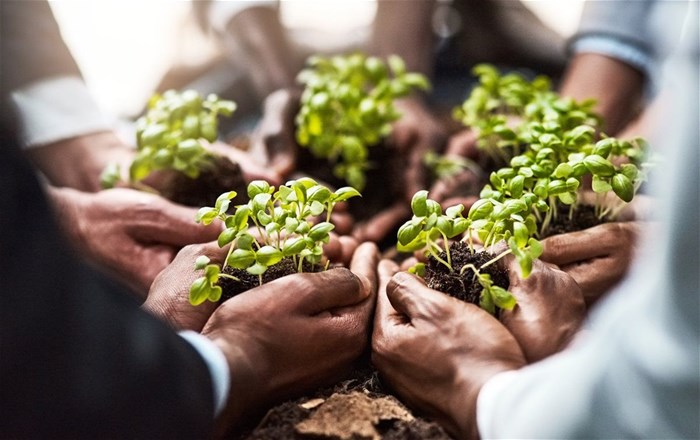Building back better on food and agriculture

Even before the pandemic, global food systems and food security were strained by many factors, including pests, poverty, conflicts and the impacts of climate change. According to the latest FAO report on The State of Food Security and Nutrition in the World, in 2019 close to 690 million – or nearly one in ten people in the world – were hungry. The Covid-19 pandemic could push an additional 130 million people worldwide into chronic hunger by the end of 2020. Furthermore, in 2019 three billion people did not have access to healthy diets and suffered from other forms of malnutrition.
Due to the pandemic and related containment measures, we have already experienced disruptions in global food supply chains, labour shortages and lost harvests. Now we are seeing a delayed planting season. Around 4.5 billion people depend on food systems for their jobs and livelihoods, working to produce, collect, store, process, transport and distribute food to consumers, as well as to feed themselves and their families. The pandemic has put 35 percent of food system employment at risk, impacting women at an even higher rate.
The impacts of this reality are both immediate and far-reaching. Together we can – and must – limit Covid-19’s damaging effects on food security and nutrition. Simultaneously, we need to transform our food systems for a more resilient and equitable future. To build back better.
From the very beginning of the pandemic, the Food and Agriculture Organization of the United Nations (FAO) has actively supported countries and farmers to work on scalable and sustainable solutions to help ensure nutritious food for all. This forms the basis of the comprehensive FAO Covid-19 Response and Recovery Programme, which identifies seven priority areas for action. However, to catalyze and build upon these solutions, a business as usual approach will not suffice. The following three strategic shifts must guide our collective response.
First, we need better data for better decision-making.
Timely and effective responses to the impact of Covid-19 depend upon knowing exactly where and when support is needed, as well as how that support can be implemented best. This means up-scaling work on data, information and analysis, and taking a bottom-up approach.
FAO is rapidly adapting and enhancing data collection methods at the country, regional and global levels, as data collection processes have been disrupted by physical distancing measures to contain the pandemic. For instance, FAO has recently released the FAO Data Lab to bring real time data on food prices and sentiment analysis. We have also developed the Hand-in-Hand Geospatial Platform which brings more than 1 million geospatial layers to help prioritize interventions within countries. These make visual datasets available to provide global early-warnings on possible hotspots that may be affected by adverse weather conditions, and how they evolve over time.
Second, we must dramatically increase the synergy of our collective actions.
The COVID-19 crisis calls for us not only to come together, but to act in unison like never before. Pooling all available data, efforts and resources for synergistic action will be paramount for a holistic response and recovery, as will collaboration on promoting economic inclusion, agricultural trade, sustainable and resilient food systems, preventing future animal-to-human disease outbreaks and ensuring coordinated humanitarian action.
The pandemic is already generating an unprecedented impact on global and regional trade, with world merchandise trade in 2020 expected to fall by as much as 32 percent . Unlike any other food or health crisis in modern times, the impacts of Covid-19 are causing supply and demand shocks at a national, regional and global level, leading to immediate and longer-term risks for food production and availability. We need to ensure the compliance of trade requirements and improve efficiency in moving goods across borders. FAO aims to facilitate and increase international agricultural and food trade, with a focus on intraregional trade.
In addition, the prevention of future animal-to-human disease outbreaks requires coordination between stakeholders from all relevant sectors. This includes the health sector, as well national and local natural resource management and rural development, in order to address potential outbreaks in high-risk hotspots. To respond to these needs, FAO and the World Health Organization (WHO) have recently strengthened the Joint FAO/WHO Centre. This Centre hosts the Codex Alimentarius Commission and unites expertise on zoonotic diseases from FAO, WHO and other global partners and coordination mechanisms, to build national capacities to predict, prevent and control zoonotic threats.
An effective food and agricultural response to the pandemic also calls for joint humanitarian action, particularly to improve the livelihoods of vulnerable smallholder and family farmers. We must thoughtfully and adequately increase collaboration and partnerships among and between United Nations’ entities, the private sector, civil society and key local actors. It is only if we all work hand in hand for greater coherence and efficiency that we can we achieve success on the ground.
Third, we must accelerate innovation.
New investment strategies, digital technology and infrastructure innovation are essential to obtaining better data, increasing efficiency in food production and providing market access. In this regard, there are many solutions from the private sector that could be of great use to governments and international organizations, which can fine-tune their methods based on the private sector’s innovation-centric, results-oriented approach.
The prevention of food crises cannot wait until the health crisis is over, nor can we simply aim to return to the unacceptable levels of hunger and food insecurity witnessed before the pandemic. FAO is placing its convening power, real-time data, early warning systems and technical expertise at the world’s disposal. Together, we can help the most vulnerable, prevent further crises, increase resilience to shocks and accelerate the rebuilding of our food systems.
Together we can ensure a future in which everyone is well nourished. I invite you to join us and be part of the solution.





